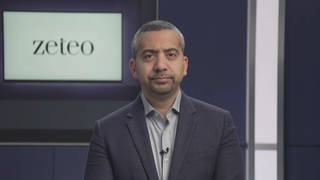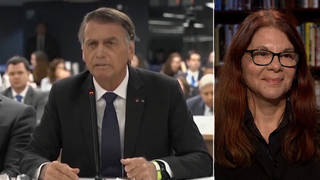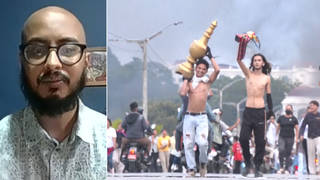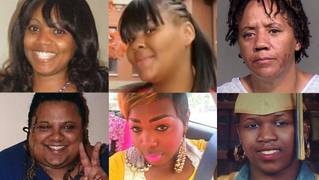
Topics
Guests
- Martinez SuttonRekia Boyd’s brother. She was killed by off-duty Chicago police detective Dante Servin in 2012. He was acquitted last month.
- Kimberlé Crenshawprofessor of law at UCLA and Columbia University and the founder of the African American Policy Forum. She’s the co-author of a new report published by the African American Policy Forum titled “Say Her Name.”
Rekia Boyd was 22 years old when she was killed in 2012 by an off-duty Chicago police detective. Dante Servin fired several shots over his shoulder into a group of people Boyd was standing with near his home, striking her in the back of her head. He was charged with involuntary manslaughter, marking the first time in 15 years a Chicago police officer was charged for a fatal shooting. But last month, in a dramatic dismissal, Judge Dennis Porter acquitted Servin on a legal fine point. While speaking from the bench, Porter suggested prosecutors should have actually charged Servin with murder. “The act of intentionally firing a gun at some person or persons on the street is an act that is so dangerous it is beyond reckless; it is intentional, and the crime, if there be any, is first-degree murder,” he said. We speak to Rekia Boyd’s brother, Martinez Sutton.
Transcript
AMY GOODMAN: We want to also talk about Rekia Boyd today, 22 years old when she was shot and killed in 2012 by an off-duty Chicago police detective. Dante Servin fired several shots over his shoulder into a group of people Rekia was standing with near his home, striking her in the back of her head. Servin claims he thought a man with the group had a gun, but no gun was ever found. He was charged with involuntary manslaughter, marking the first time in 15 years a Chicago police officer was charged for a fatal shooting. But last month, in a dramatic dismissal, Judge Dennis Porter acquitted Servin on a legal fine point.
JUDGE DENNIS PORTER: Simply put, the evidence presented in this case does not support the charges on which the defendant was indicted and tried. The motion for a directed finding is granted. There is a finding of not guilty on all counts, and the defendant is discharged.
JUAN GONZÁLEZ: Speaking from the bench, Porter suggested prosecutors should have charged Servin with murder. After Servin was acquitted for killing Rekia Boyd, her mother, Angela Helton, responded to claims Servin had feared for his life and did not intentionally kill her daughter.
ANGELA HELTON: This man is known around the area that he lives. The day before my daughter got shot and killed, he asked some of the residents, “What do I have to do here to get some peace? Shoot a blankety-blank-blank?” So—and that’s what he did the next day.
AMY GOODMAN: Martinez Sutton, if you could talk about what happened to your sister, Rekia? The judge dismissed the case against the officer, saying that it shouldn’t have—he shouldn’t have been charged with involuntary manslaughter. He should have been charged with murder?
MARTINEZ SUTTON: Yes. The judge said it should have been murder charges put on the officer, instead of involuntary manslaughter, and also said that he can’t be intentional and reckless at the same time. And we had second-degree murder charges on him at first, before they announced it. But at the last minute, once they found out I talked to the officer, they changed it to involuntary manslaughter to further protect him.
AMY GOODMAN: What do you mean, once you talked to the officer?
MARTINEZ SUTTON: Well, I was doing a documentary for my school, and as we were shooting the documentary, he pulled up in the same car that he killed my sister in. And he gets out the car and said, “Who are you people?” And they said, “This is Martinez Sutton, Rekia Boyd’s brother.” And he looked surprised, and he was like, “You’re Rekia’s brother?” I said, “Yes, I am.” And he said, “Can I get a hug?” So I stared at him for a sec, and I embraced him. And he started with, “I’m so sorry. I’m so sorry. I didn’t mean to kill your sister. I’m so sorry. Your sister was innocent. But I tried to kill that MFer. Ooh, I wish it was him that I shot in the head, instead of your sister. Ooh, I wish it was him that was dead.” Then he went back to “I’m so sorry. Now my heart is clear. I pray to the three Marys across the street every day, every time I leave this alley.” How can you wish somebody was dead? How can you wish somebody else’s life was taken? Why do you want to take somebody’s life off this Earth?
JUAN GONZÁLEZ: Has there been any indication, since the judge’s decision, by the prosecutors that they’re going to—that they’re going to seek a—or can they even, since that might be double jeopardy, seek to prosecute him for murder?
MARTINEZ SUTTON: I haven’t even heard from the prosecutors since this case has been over. They haven’t called me. They haven’t contacted me at all. It just further shows that they was working with the police all along.
AMY GOODMAN: After Detective Dante Servin was acquitted of manslaughter charges, Cook County State’s Attorney Anita Alvarez said in a written statement, quote, “I am extremely disappointed by the Judge’s ruling. The State’s Attorney’s Office brought charges in this case in good faith and only after a very careful legal analysis of the evidence as well as the specific circumstances of this crime.” Your response, Martinez?
MARTINEZ SUTTON: They didn’t do everything that they could do. When I asked them, “Why did you take away the second-degree murder charges? Why did you take away the first-degree? Why can’t we get first-degree murder?” and the prosecutor steadily told me, “Martinez, I know what I’m doing. I’ve got over 20 years of experience in doing this. Are you a lawyer?” I said, “Well, I don’t have to be a lawyer to know the right charges.” And he constantly said, “Well, I have over 24 years of experience. Let me do my job.” And you see the job that he done.
JUAN GONZÁLEZ: Well, this is Chicago police detective Dante Servin addressing reporters after he was acquitted on manslaughter charges in the shooting death of your sister.
DANTE SERVIN: I also explained to the family that if this was what they needed for closure, for me to be charged, I hope they got what they were looking for. And I hope—my family is praying for them, and we will continue to pray for them, for their loss. My heart goes out to the family. I need—I need you to know that my family and I have also suffered greatly during the past three years, and we will continue to suffer. This is something that I will live with for the rest of my life. My job is to save lives and to protect people.
JUAN GONZÁLEZ: Your reaction to Detective Servin’s remarks?
MARTINEZ SUTTON: His family also has been through something for three years. My family has to go through this for a lifetime. A lifetime. He gets to go home and create memories. The only memories I have is on a T-shirt. It’s not the same. Dante, he told me his version of what happened that night. And from what he said—”I shot out the car, and then I got out the car and continued to fire”—he was looking for blood that night. So—
AMY GOODMAN: I mean, the judge’s words are chilling. Citing case law, Judge Porter said that the charge, involuntary manslaughter, was inappropriate. He said the act of intentionally firing a gun at some person or persons on the street is an act that is so dangerous it is beyond reckless; it is intentional, and the crime, if there be any, is first-degree murder.” That’s not you saying this, Martinez. This is the judge, who said that involuntary manslaughter did not cover what happened, that it should be first-degree murder. And he dismissed the case, and it’s not being brought—Kimberlé Crenshaw, can you—
KIMBERLÉ CRENSHAW: So, you know, it really boggles my mind. To say legal technicality, I think, is just, you know, an illustration of how this system actually protects the officer. So basically he’s saying he did much more than what he was charged of, so because he did more than what he was charged with, we’re going to let him go.
You know, just to broaden the entire frame, these are two stories of nine families that are coming forward today to lift up their family members. The vigil is designed to remember their names, to lift them up. At noon today at New York law school, they’re going to be talking more about the specifics of their families’ cases, but, importantly, the kinds of interventions that they’re calling for—number one, having a detail of officers who respond to domestic disturbances or mental health crises, who are trained, rather than someone who could say, “I shot someone because of the look on their face.” I mean, what is that saying about the concern about the public that these officers are designed to or supposed to protect? That’s where we see the stereotypes. That’s where we see precisely the kind of thing that Mike Brown—the person who killed Mike Brown said he saw—it, a monster—that’s essentially what this officer is saying. Or, you know, Rekia happens to be with some people that the officer really wants to kill, and it doesn’t matter that she’s killed by that. So, there are many stories like this. It’s important that we lift them up. My co-author, Andrea Ritchie, Black Youth Project 100, we are all coming together over the next two days to lift up these stories. And we’re hoping that all people who are concerned about police violence bring women into the conversation, all women into the conversation, to demand the kind of reforms we all need.
AMY GOODMAN: We want to thank you so much for being here, Kimberlé Crenshaw, professor of law at UCLA and Columbia University, founder of the African American Policy Forum, co-author of this new report we’ll link to called “Say Her Name.” And I want to thank you, Martinez Sutton, for being here. I know how difficult this is for you to recount what happened to your sister, Rekia Boyd, again, killed by an off-duty Chicago police detective, Dante Servin, in 2012. He was acquitted last month. And I want to thank Fran Garrett for being with us today, mother of Michelle Cusseaux, who died just last August, killed also by a Phoenix police officer. Our condolences to you both.
This is Democracy Now! When we come back, we’re going to Seattle. Stay with us.












Media Options